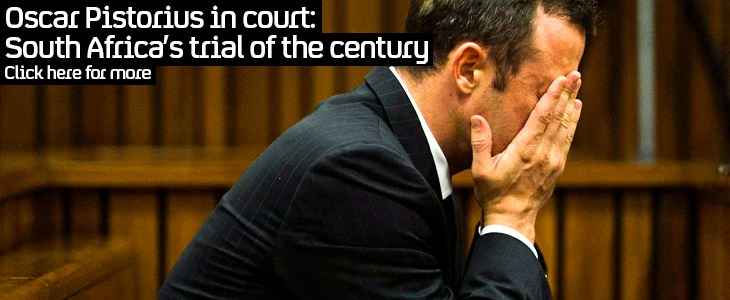Pistorius trial to resume after ‘game changer’ mental tests
Oscar Pistorius’s murder trial resumes on Monday after a 30-day psychiatric assessment. Channel 4 News speaks to one of South Africa’s leading lawyers about how its outcome will affect the trial.

For the past six weeks, Oscar Pistorius has swapped the courtroom for a hospital, where he has undergone daily mental health tests by a team of psychiatrists.
Judge Thokozile Masipa ruled that the assessment was crucial to determine the accused’s mental health, and whether he could be judged criminally responsible, after a defence witness said that he had generalised anxiety disorder (GAD).
On Monday, the court will hear the medical team’s conclusions – and whatever their findings, it will have a huge impact on the outcome of the trial that has gripped South Africa. The 27-year-old athlete is accused of killing his girlfriend Reeva Steenkamp after an argument in February last year. He denies the charge, and says the shooting was an accident. The dramatic trial has been broadcast live around the world.
State of mind
The decision to get an independent judgement on Pistorius’s mental health was made after testimony from Dr Meryll Vorster, who said that the accused had suffered from anxiety from a very young age. She said this meant he would have had a different response to the incident than those without anxiety problems.
Following her evidence, the judge agreed with prosecutors that an independent assessment needed to be made on Pistorius’s state of mind.
In a nutshell, it is the one thing that can destroy the defence case completely. Renier Spies
Determining whether an individual can tell right from wrong – and can act accordingly – is crucial to any criminal case: someone must be judged to have “capacity” to know right from wrong, if they are to be held criminally responsible.
And casting doubt on Pistorius’s state of mind could lessen his sentence. “Hearing evidence from Dr Vorster, it became clear to me that it was a defence tactic: first of all, they wanted to neutralise the fact that Pistorius was, to put it plainly, a terrible witness, because it can now be argued he was a terrible witness because he suffers from this condition,” criminal lawyer Renier Spies told Channel 4 News.
“Secondly, they lowered the benchmark by which his (Pistorius’s) conduct is measured – the ‘reasonable man’ test.” In other words, the defence was trying ensure that background factors would be taken into consideration by the judge.
Outcomes in brief:
– Assessors conclude that Pistorius suffers no anxiety problems.
– They find he had some diminished responsibility: if he is convicted, this may be considered as a mitigating factor during sentencing.
– If if is found that he did not have mental “capacity” brought about by the alleged mental condition(s), he cannot be convicted of an offence. The case could in theory collapse in this instance – but that scenario is highly unlikely.

Outcome one: Pistorius has no mental health problems
Much of the defence case has centred on Pistorius’s anxious disposition, and his fear of being robbed. Defence Lawyer Barry Roux has tried to show that Pistorius was scared of intruders entering his home, that he felt vulnerable as an amputee, and that life in the glare of the limelight made him very anxious.
But if independent assessors decide Pistorius does not have GAD, all of the efforts by the state to provide explanations for his actions can no longer be considered by the trial.
As a result, getting the court to refer him for independent assessment was a “stroke of genius” by prosecutors, said Mr Spies. “In a nutshell, it is the one thing that can destroy the defence case completely… They (prosecutors) can argue that at no stage relevant to any allegations was there anything wrong with him, on a psychological basis,” Mr Spies told Channel 4 News.
“This would mean there are no excuses any more. And it would certainly empower the court to make the finding that Pistorius endeavoured to mislead everyone from the start… That is going to change the game quite drastically.”
Outcomes two and three
On the other hand, the assessors could come back and say that Pistorius is suffering from anxiety problems – and that this impacted on his actions when he shot his girlfriend dead.
This would mean he cannot be convicted of any offence, as he had “no capacity to appreciate the wrongfulness of his action,” said Mr Spies.
The third option is a kind of half-way house: assessors could say that his mental state had some impact on his capacity to commit the crime, but that he would still have been able to distinguish between right and wrong. This would come into play at the sentencing stage, if Pistorius is found guilty of murder, or premeditated murder.
Pistorius ‘was a terrible witness’
Part of the reason Dr Vorster’s evidence is considered important by the defence, is because they hoped it could undo the damage that the accused did when he was in the stand.
“I’m not alone when I say he was a terrible witness,” Mr Spies told Channel 4 News. “Every aspect can be criticised: there were numerous material contradictions, I’m sure Gerrie Nel will criticise his demeanour and inherent improbabilities in his evidence.”
As a result, both defence and prosecution will be waiting with baited breath for what assessors decide, on one of the biggest days of the trial so far.
